


By Mary L. Tabor
Outer Banks Publishing Group author
How does autobiography work in fiction?
Subtitle: Why my collection of short stories The Woman Who Never Cooked might in some sense be called non-fiction. Here’s the probing answer to the difficult question, Where is the TRUTH? (*asterisks refer to footnotes at the end of this essay).
You know the line: Truth is stranger than fiction? I have a twist on that. I’ve learned through the writing of three books and a fourth in process* as I write this essay that the fictional account of my stories have greater emotional truth and intellectual significance than the factual ones.
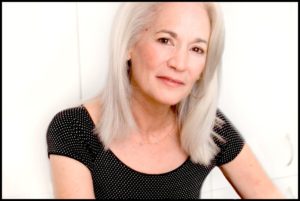
Mary L. Tabor
As memoir has increased in popularity** both in books and movies—“A True Story” being the familiar movie tag—I’ve continued to argue that fiction, written close to the bone, will likely provide the reader with a deeper look into the life and soul of the writer, but more important, the reader if the story is worth your time.
Think first of this question, one that I pose to myself for purposes of this essay: Do you think self-revelation is part of the process of writing?
My answer: Any serious writer who denies it, lies.
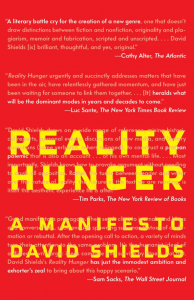
Reality Hunger by David Shields
I agree with David Shields who argues in favor of self-revelation and to a large extent against the novel that is not self-revelatory. He does so in Reality Hunger through a series of quotes, occasionally his own—unabashedly without full attribution (but that’s another story) using only the name of the writer. Here’s John Berger, “Authenticity comes from a single faithfulness: that to the ambiguity of experience.” And later, the late David Foster Wallace, “I don’t know what it’s like inside you and you don’t know what it’s like inside me. A great book allows me to leap over that wall: in a deep, significant conversation with another consciousness, I feel human and unalone.” ***
A serious writer can’t help but reveal even as the lie of fiction operates.
Lee K. Abbott, a writer and teacher I know and admire, has put the issue succinctly this way: “All stories are true stories, especially the artful lies we invent to satisfy the wishful thinker in us, for they present to us, in disguise often and at great distance, the way we are or would want to be.” ****
My collection of short stories includes three memoir pieces I don’t identify and I will use them here to explain why I argue that the fiction is more powerful, more truthful, if you will, than the so-called true story.
First, I give as example a comparison of what is essentially the same story told in fiction and also in memoir.
I put aside my novel Who by Fire (reviewed by Michael Johnson, regular columnist on FactsandArts.com) that was close to finished when my husband said after 22 years of marriage, oh-so-Greta-Garbo, “I need to live alone.”
This event stopped me in my tracks—and eventually I blogged my life while I was living it. That blog turned into the memoir (Re)Making Love. That book like Who by Fire is a love story but oddly one that fiction would probably not find credible.
I learned through these two books that the fictional account of my story has greater emotional truth and intellectual significance than the factual one that you can find online and in the 2011 Valentine’s Day issue of Real Simple Magazine where my husband and I tell our story.
Here’s how I learned what the so-called true story didn’t reveal. I am the reader for the audible.com version of Who by Fire. While reading it aloud in an NPR recording studio, I discovered my own book as if for the first time. I realized I’d written this novel to find the man I must have known on the unconscious level I was losing. Good fiction, meaning you know while you’re reading that the writer is risking her life, can go to this place of hard truth in a way that memoir because of its hold on the so-called facts can’t do if the writer is honest—and honesty is the key word here to understand my meaning.
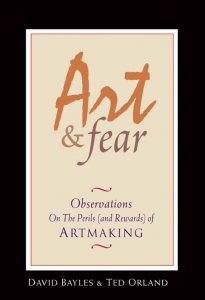
Art and Fear by David Bayles and Ted Orland
In their book Art and Fear, David Bayles and Ted Orland explain our resistance to fiction—or to any art—this way: “[T]he prevailing premise remains that art is clearly the province of the genius (or, on occasion, madness). … [A]rt itself becomes a strange object—something to be pointed to and poked at from a safe analytical distance. To the critic, art is a noun.
“Clearly, something’s getting lost in the translation here. What gets lost, quite specifically, is the very thing artists spend the better part of their lives doing: namely, learning to make work that matters to them. … [W]hat we really gain from the artmaking of others is courage-by-association. Depth of contact grows as fears are shared—and thereby disarmed—and this comes from embracing art as process, and artists as kindred spirits. To the artist, art is a verb.” *****
I decided to further prove the force of fiction by revising the title character’s name to Olivia in each of The Woman Who Never Cooked’s stories. The allusion is to that character in Shakespeare’s Twelfth Night, the comedy that takes center stage in the story “Madness and Folly” about my father after he broke his hip—in real life and here in fiction.******
I could say that I am hidden inside the fiction—but in fact I am not. In the fiction, I used food and adultery as metaphor for the grief I bore through my mother’s, my father’s and my sister’s illnesses and deaths. I wasn’t sure who I was. As a prime example, I didn’t know when I wrote “The Woman Who Never Cooked,” the title story, that I would become that woman.
When I first wrote each of the stories the central character had the same name in every story because I knew that what I was doing was direct, tough purposefully artful exaggeration of my autobiography. My agent at the time suggested that I change the main character’s name to hide that fact. But the book only achieved publication after I added two of the three memoir pieces that had been published in literary magazines. All the stories have been published first that way, and the importance of the small literary magazine, I talk about here. You may go there and read that essay, entitled “Miss Rich is married and living in Cambridge, Mass.”, referring to the poet Adrienne Rich in an early bio when she first published, and the essay names places you might also choose to publish your work.
The stories in the collection that are memoir are: “Rugalach,” a tribute to my mother; “Losing,” a tribute to my father; and the eponymous closing story “The Woman Who Never Cooked.”
Let’s talk about the fiction and why I am now convinced that each of the other eight stories is more powerful, more truthful than the memoir—with the exception of “The Woman Who Never Cooked.” I say this about the last because it is written in third person like a fairy tale. The opening line is, “There once was a woman with 327 cookbooks who never cooked.” Through food, this true-to-its-core memoir tells the story of my mother’s, my father’s and my sister’s illnesses and the effect on living that their trials had on me.
For the second edition, I changed the central character in all the stories to “Olivia.” You may read one of the short stories “The Burglar” for free here at The Santa Fe Writers Project where the collection won the grand prize. That story and was published twice before appearing in the book of short stories. I’ll use this story to explain.
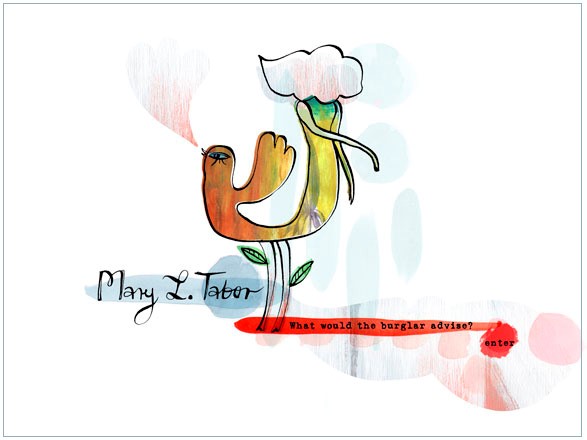 The image above that I use on my website was designed by Zaara.com and uses the line “What would the burglar advise?” a line inside the story—not exactly a line you’d expect in a story written as non-fiction.
The image above that I use on my website was designed by Zaara.com and uses the line “What would the burglar advise?” a line inside the story—not exactly a line you’d expect in a story written as non-fiction.
You would think me mad if I’d written this as memoir because the actual burglar is alive and well in this story—something only fiction can achieve without madness. Even Robin Hood and maid Marian appear in the story in an Internet game.
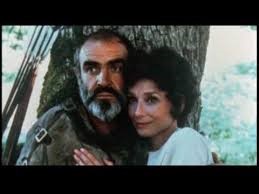 Audrey Hepburn as Maid Marian and Sean Connery in the 1976 flick.
Audrey Hepburn as Maid Marian and Sean Connery in the 1976 flick.
But the burglar himself is essential to express the love letter to my husband that I wrote here in the aftermath of my mother’s death and a burglary that actually did occur in our home while we were away visiting both our children at college. These facts I compress into the story’s essence.
So where is the truth? Does Ruth/Olivia actually desire the burglar? Does a burglar come to her home from his on Virgilia, a street near mine where the burglary actually occurred? Does it matter that I still own the locket that is in the burglar’s pocket and that the actual burglar chose all my other jewelry to steal and left behind the locket with its crude seal?
With that fact, the story wrote itself. Locket in hand that my mother had saved with a lock of her mother’s hair sealed inside, I went on the journey of discovery and the result is heartfelt non-fiction that cannot accurately be called that.
Joyce Carol Oates has put the conundrum of literary fiction so often spurned for the “true” story because, What can one learn from a “fiction”? this way:
“So much of literature springs from a wish to assuage homesickness, a desire to commemorate places, people, childhoods, family and tribal rituals, ways of life—surely the primary inspiration of all: the wish, in some artists clearly the necessity, to capture in the quasi permanence of art that which is perishable in life. Though the great modernists—Joyce, Proust, Yeats, Lawrence, Woolf, Faulkner—were revolutionaries in technique, their subjects were intimately bound up with their own lives and their own regions; the modernist is one who is likely to use his intimate life as material for his art, shaping the ordinary into the extraordinary.” *******
What I hope to have done here and for all the stories I’ve written that are quote fiction is to lift the curtain on that much misunderstood word. I argue that to dismiss out of hand the truth that close-to-the-bone, self revelatory fiction reveals is to miss a connection that may reveal to you those quote truths that would otherwise remain unspoken. The reason? Fiction, like all the arts that reveal through artifice, frees the unsayable. Why oh why would any of us who read or go to movies or art museums or photographic exhibits wish to miss that unsayable truth because we want the quote true story?
· *Dangerous Love my novel (am completing now).
· ** As an example, Leigh Gilmore, author of The Limits of Autobiography, notes that “…[T]he number of new English language volumes categorized as ‘autobiography or memoir’ roughly tripled from the 1940s to the 1990s. (Analysis based on data from the Worldcat database). See p. 1, footnote 1 of her book, Cornell University Press, 2001.
· *** David Shields, Reality Hunger, “412’ John Berger, p. 139; ‘421,’ David Foster Wallace, p. 141, Alfred A. Knopf, 2010.
· **** Lee K. Abbott, “Fifty Years of Puerto Del Sol,” Puerto Del Sol, Vol, 50, 2015, p. 194.
· ***** David Bayles and Ted Orland, Art and Fear, Capra Press 1997 p. 89.
· ****** Mary L. Tabor, The Woman Who Never Cooked, Mid-list Press, 2006. Mary L. Tabor, The Woman Who Never Cooked, second edition kindle and paperback version, Outer Banks Publishing Group, 2019.
· ******* “Inspiration and Obsession in Life and Literature,” Joyce Carol Oates, New York Review of Books, August 13, 2015.

Outer Banks Publishing Group author Mary L. Tabor contributed her writing expertise on Day 3 of a 30-day writing challenge sponsored by Wattpad.
Watch her video on creating the right point of view
Learn more with Mary’s bestselling stories about women’s challenges in today’s hyperspeed society, The Woman Who Never Cooked. The book is now published in its second edition by Outer Banks Publishing Group and available in our bookstore, on Amazon and in bookstores everywhere. The book is
“The American adult woman is featured in this debut collection of stories about love, adultery, marriage, passion, death, and family. There is a subtle humor here, and an innate wisdom about everyday life as women find solace in cooking, work, and chores. Tabor reveals the thoughts of her working professional women who stream into Washington, D.C., from the outer suburbs, the men they date or marry, and the attractive if harried commuters they meet.
“Her collection of short stories The Woman Who Never Cooked, published when she was 60, won the Mid-List Press First Series Award.
“Mary Tabor writes with astonishing grace, endless passion, and subtle humor,” wrote reviewer Melanie Rae Thon.

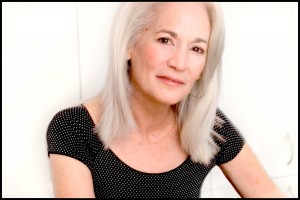
Author Mary L. Tabor
Do you live in Boston or near Newton, Massachusetts?
Outer Banks Publishing Group author Mary L. Tabor will give a public talk this Tuesday, Oct. 18 at Mt. Ida College as their Woodrow Wilson Visiting Fellow this week.
Wadsworth Lecture: Mary Tabor on Business and Art
When: Tuesday, Oct. 18th
Where: Campus Center Theater
Contact: Jamie Elliott
(617) 928-7351jelliott@mountida.edu
Mary will give a talk on her journey from high school English teacher to corporate
executive and the leap to creative work, to art. She will end the talk with a short
reading of one of her stories.
MARY TABOR
Author; former public affairs director, American Petroleum Institute
Mary Tabor published her first book of fiction at age 60 after a 16-year career in corporate
America, a senior executive, director of public affairs writing for the oil industry.
She was a high school English teacher who joined the business world, then made
a transition from the business world to the creative world, leaving her corporate
job when she was 50 to earn an MFA degree in Creative Writing.
Her first book, The Woman Who Never Cooked, won Mid-List Press’s First Series Award.
Ms. Tabor’s experience spans the worlds of journalism, business, education and fiction writing.
She was a visiting writer at University of Missouri in Columbia, and has been a long-time professor of Creative Writing at George Washington University and she works with the Washington, DC, library to reach less-privileged populations on how to begin writing.
Mary’s books will be available for sale at the event: The Woman Who Never Cooked: connected
short stories, (Re)Making Love: a memoir, and Who by Fire: a novel.
Or you can purchase any of them at our bookstore.
______________________________
Who by Fire
by Mary L. Tabor
List Price: $17.95
6″ x 9″ (15.24 x 22.86 cm)
Black & White on Cream paper
248 pages
Outer Banks Publishing Group
ISBN-13: 978-0982993149
ISBN-10: 0982993145
BISAC: Fiction / Literary
Who by Fire breaks new literary ground.
Mary L. Tabor has written a complex tale of love, betrayal, discovery and the search for self.
The form of the novel itself breaks ground. A male narrator tells the story he does not actually know but discovers through memory, through piecing the puzzles of his marriage, through his wife’s goodness and her betrayal. He confronts paradox with music, science and a conflagration he witnessed in his native Iowa. Underlying his search is the quest for heroism and the search for his own father.
Quite simply, Who by Fire is like nothing else you have read and has earned its place among books that matter.
Buy a paperback copy for $10.99
(Re)Making Love
by Mary L. Tabor
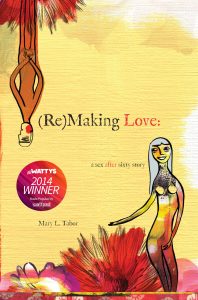 List Price: $11.75
List Price: $11.75
6″ x 9″ (15.24 x 22.86 cm)
Black & White on Cream paper
212 pages
Outer Banks Publishing Group
ISBN-13: 978-0982993170
ISBN-10: 098299317X
BISAC: Biography & Autobiography / Women
When Mary L. Tabor’s husband of 21 years announced, “I need to live alone,” she cratered and turned to the only comfort she had left: her writing.
What resulted was (Re)MAKING LOVE: a sex after sixty story, a fresh, witty, funny and brutally honest memoir of everything she felt and did during her long journey back to happiness.
This deeply personal account of her saga takes the reader from Washington, DC to Missouri to Australia through the good, the bad and the foolish from Internet dating to outlandish flirting and eventually to Paris where an unexpected visitor changed the author’s life forever.
Her story offers hope and joy told with passion and brilliance that is highly refreshing with the single and most prominent message—it is never too late to find love—and oneself even after age sixty and beyond.
Buy a paperback copy for $9.99
The Woman Who Never Cooked – Out of Print – the second edition is available here
by Mary L. Tabor
Series: First Series: Short Fiction
Paperback: 175 pages
Publisher: Outer Banks Publishing Group
Language: English
ISBN-10: 0922811687
ISBN-13: 978-0922811687
Product Dimensions: 9 x 6.1 x 0.6 inches
“The American adult woman is featured in this debut collection of stories about love, adultery, marriage, passion, death, and family. There is a subtle humor here, and an innate wisdom about everyday life as women find solace in cooking, work, and chores. Tabor reveals the thoughts of her working professional women who stream into Washington, D.C., from the outer suburbs, the men they date or marry, and the attractive if harried commuters they meet.”
Her collection of short stories The Woman Who Never Cooked, published when she was 60, won the Mid-List Press First Series Award. “Mary Tabor writes with astonishing grace, endless passion, and subtle humor,” one reviewer noted.
Two great titles from OBX Publishing Group author Mary L. Tabor are now reduced through Outer Banks Publishing Group. Visit our bookstore to order.
WHO BY FIRE breaks new literary ground: A complex tale of love, betrayal, and the search for self. A male narrator tells the story he does not actually know but discovers through memory, through piecing the puzzles of his marriage, through his wife’s goodness and her betrayal. He confronts paradox with music, science and a conflagration he witness in his native Iowa. Underlying his search is the quest for heroism and for his own father. WHO BY FIRE has earned its places among books that matter.
“The beauty of the prose, the nuances of the characters, the ever-building plot—everything is in place for a novel that will touch you in all the right ways.”—Lee Martin
“Mary L. Tabor’s WHO BY FIRE is a lovely, innovative, deeply engaging novel about how it is that human beings make their way through the mysteries of existence.”—Robert Olen Butler
When Mary L. Tabor’s husband of 21 years announced, “I need to live alone,” she cratered and turned to the only comfort she had left: her writing. What resulted was (Re)MAKING LOVE: a sex after sixty story, a fresh, witty, funny and brutally honest memoir of everything she felt and did during her long journey back to happiness. This deeply personal account of her saga takes the reader from Washington, DC to Missouri to Australia through the good, the bad and the foolish from Internet dating to outlandish flirting and eventually to Paris where an unexpected visitor changed the author’s life forever. Her story offers hope and joy told with passion and brilliance that is highly refreshing with the single and most prominent message—it is never too late to find love—and oneself even after age sixty and beyond.